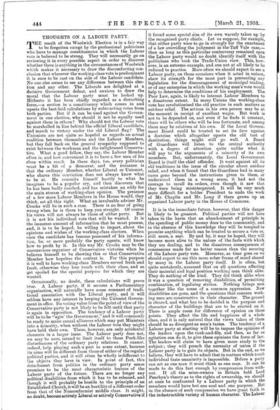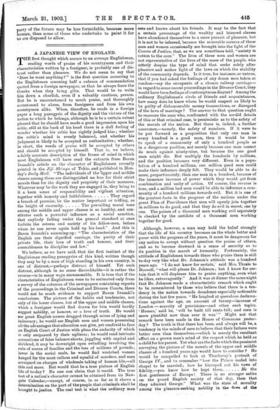THOUGHTS ON A LABOUR PARTY.
filHE result of the Woolwich Election is in a fair way 1 to be forgotten except by the professional politicians who have to manage constituencies in which the Labour vote is believed to be strong. They will necessarily go on reviewing it in every possible aspect in order to discover whether there is anything in the circumstances of Woolwich which makes it necessary to draw the discomforting con- clusion that wherever the working-class vote is predominant it is sure to be cast on the side of the Labour candidate.
No one else seems to see any difference between this elec- tion and any other. The Liberals are delighted at a decisive Government defeat, and anxious to draw the moral that the Labour party must be looked up. Hitherto it has been chiefly regarded as a disturbing force,—a section in a constituency which comes in and upsets the best-laid calculations by subtr acting votes from both parties. But if it can be used against the Govern- ment in one election, why should it not be equally used against them in others ? Why should not the Labour vote be marshalled in line behind the official Liberal candidate, and march to victory under the old Liberal flag? The Unionists are not quite so hopeful as regards an actual coalition between themselves and the Labour Members, but they fall back on the general sympathy supposed to exist between the workman and the enlightened Conserva- tive. What a good fellow, they say, the Labour Member often is, and how convenient it is to have a few men of his class within reach. In these days, too, every politician must be a bit of a democrat, and the nuisance is that the ordinary Member, whether Liberal or Unionist, who shares this conviction does not always know what to be at. He commits himself hastily to what he imagines to be a popular cry, and then discovers that he has been badly coached, and has mistaken an eddy for the main stream of working-class opinion. The presence of a few more Labour Members in the House would, they think, set all this right. What an invaluable adviser Mr. Crooks will be in such a case. There is no fear of going wrong when he is there to keep you straight. Of course his views will not always be those of either party. But it is not his individual vote that will be wanted. It is the immense amount of information that he must possess, and, it is to be hoped, be willing to impart, about the opinions and wishes of the working-class electors. When once the candidate has become possessed of his informa- tion, he, or more probably the party agents, will know how to profit by it. In this way Mr. Crooks may be the unconscious organiser of Conservative victories when he believes himself to be showing this or that Conservative Member how hopeless the contest is. For this purpose it is well to have working-class Members served fresh and fresh, otherwise they lose touch with their class, and so get spoiled for the special purpose for which they are wanted.
Occasionally, no doubt, these calculations will prove true. A Labour party, if it secures a Parliamentary organisation, will naturally have some remnant of tradi- tional association with the Liberal party, and it will seldom have any interest in keeping the Unionist Govern- ment in office. Its voting value from the point of view of the Conservative party is not likely to be felt until that party is again in opposition. The tendency of a Labour party will be to be "agin' the Government," and it will commonly be ready to make casual alliances which may put Ministers into a minority, when without the Labour vote they might have held their own. These, however, are only accidental elements in a larger issue. The Labour party does not, we may be sure, intend to limit itself to these Puck-like disturbances of the ordinary party relations. It cannot, indeed, help playing such a part to some extent, because its aims will be different from those of either of the regular political parties, and it will often be wholly indifferent to the objects they have in view. In point of fact, this detachment from politics in the ordinary party sense promises to be the most characteristic feature of the Labour party of the future. There are no longer any political disabilities from which it has to be released, and though it will probably be hostile to the principle of an Established Church, it will be an hostility of a different order from that of the Nonconformist middle class. It might, no doubt, become actively liberal or actively Conservative if it found some special aim of its own warmly taken up by the recognised party chiefs. Let us suppose, for example, that either party were to go in strongly for the enactment of a law overriding the judgment in the Taff Vale case,— then as long as this particular controversy remained open the Labour party would no doubt identify itself with the politicians who took the Trade-Union view. This, how- ever, is an extreme example, and one not at all likely to be reduced to practice. More often we should expect to see a Labour party, on those occasions when it acted in unison, show its strength for the most part in preventing any legislation for the discouragement of municipal trading, or of any enterprise in which the working man's vote would help to determine the conditions of his employment. The Poor Law, again, is likely to interest Labour Members to a disastrous extent. In many Unions the working-class vote has revolutionised the old practice in such matters as outdoor relief. The artisan in his own person may be at the moment in receipt of excellent wages. But work is not to be depended on, and even if he finds it constant, there will be others who will be less fortunate, and among them may be relatives of his own. If the Local Govern- ment Board could be trusted to set its face against a doctrine which altogether upsets the old test of destitution, things might still go well. A Board of Guardians will listen to the central authority with a degree of attention quite unlike what it will pay to the arguments of a minority of its own members. But, unfortunately, the Local Government Board is itself the chief offender. It went against all its old traditions in the issue of the circular about outdoor relief, and when it found that the Guardians had in many cases gone beyond the instructions given to them, or understood them in a wrong sense, it had not the courage to recall its orders, even though it saw that they were being misinterpreted. It will be very much more difficult for a bolder President to undo the work of Mr. Chaplin and Mr. Long if there grows up an organised Labour party in the House of Commons.
It is in the immediate future, however, that this danger is likely to be greatest. Political parties will not have taken in the harm that an abandonment of principle in the spending of public money does to the community, and in the absence of this knowledge they will be tempted to promise anything which can be trusted to secure a vote or, still more, a seat. By and by, it may be hoped, they will become more alive to the nature of the facts with which they are dealing, and to the disastrous consequences of concessions made for no better reason than the securing of the Labour party vote. Moreover, as time goes on we should expect to see this more sober frame of mind shared by many in the Labour party itself. It is often, but. quite mistakenly, assumed that on all questions affecting their material and legal position working men think alike. They do nothing of the kind. They did think alike when it was a question of removing disabilities, of permitting combination, of legalising strikes. Nothing brings men together like the sense of a common oppression. Now disabilities are gone, and the questions that concern work- ing men are constructive in their character. The ground is cleared, and what has to be decided is the purpose and character of the buildings that are to be erected on it. There is ample room for difference of opinion on these points. They affect the life and happiness of a whole class, and it is only natural that the views taken of them should be as divergent as men's tastes. The tendency of a Labour party at starting will be to impose the opinions of the leaders upon the rank-and-file, and then, so far as agitation can do it, to give these opinions the force of law. The leaders will claim to have given more study to the subject; they will preach the necessity of union if the Labour party is to gain its objects. But in the end, as we believe, they will have to admit that in matters which touch individual taste unanimity is impossible. Before a party can act as one man it must think as one man. It can be made to do this fast enough by compression from with- out. If all the mine-owners in Britain held Lord Penrhyn's theory as to the rights of ownership, we should at once be confronted by a Labour party in which the members would have but one soul and one purpose.. But in the absence of such compression we have great faith in the indestructible variety of human character. The Labour
party of the future may be less formidable, because more human, than some of those who undertake to paint it for us are disposed to allow.











































 Previous page
Previous page